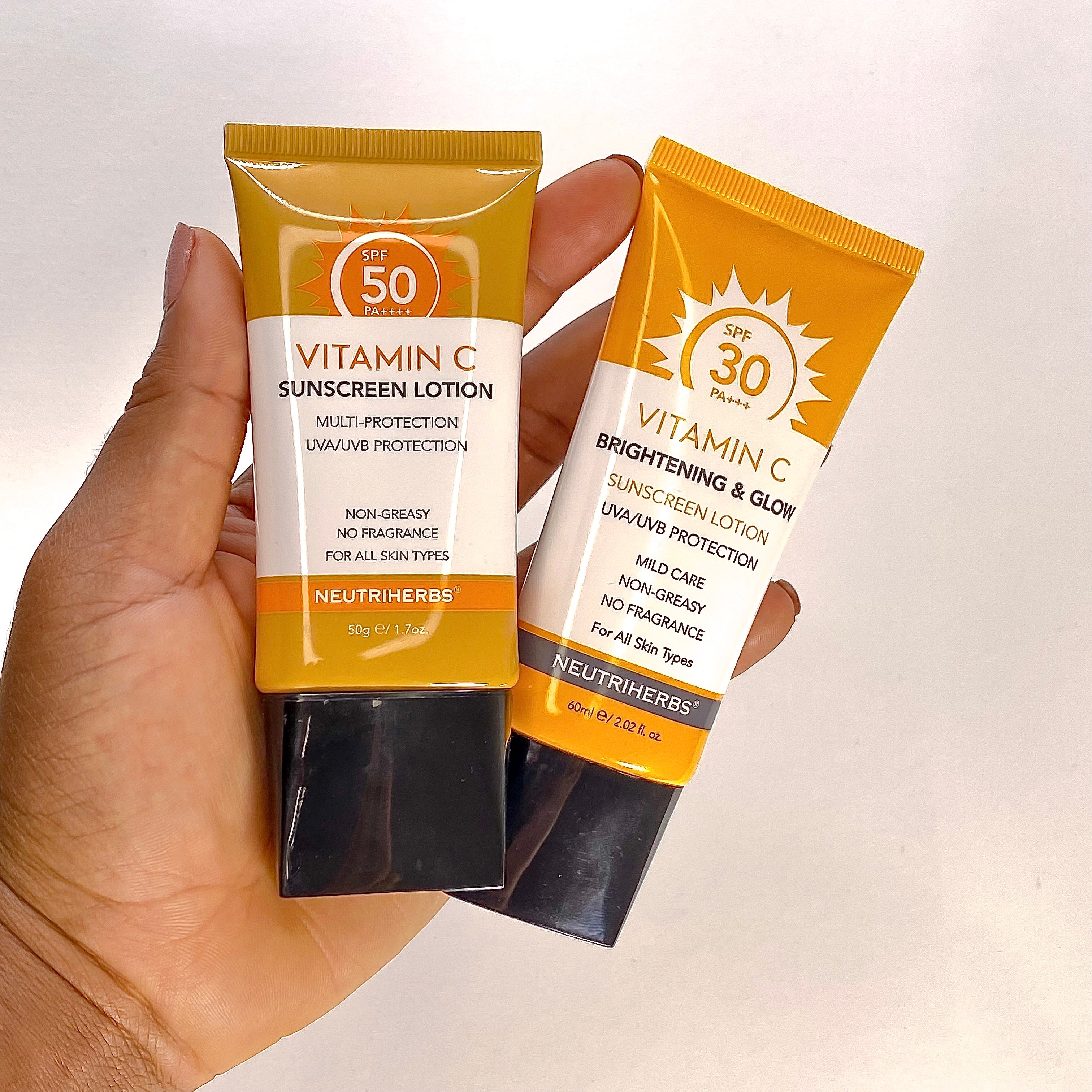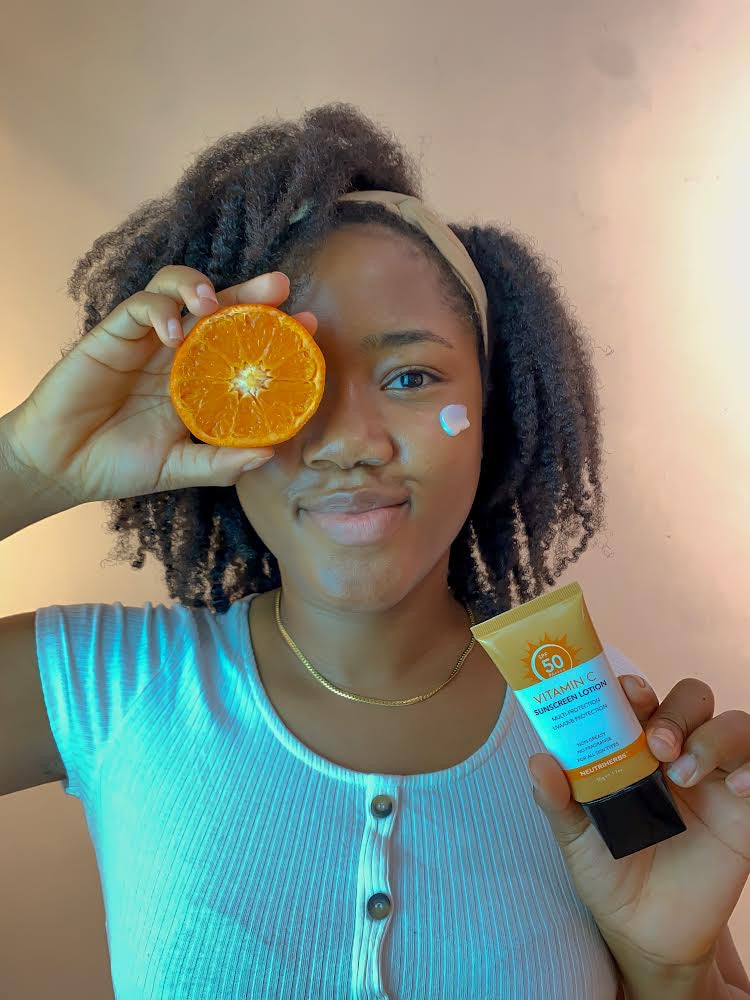
SPF 30 or SPF 50: what's the difference really? Is one better than the other? And if so, which should you be using?
Before we split the difference, let’s first talk about UV Radiation (Ultra Violet Radiation).
Understanding UV radiation and how it damages your skin is an important first step in safeguarding your skin.
UV radiation isn't always bad. In small doses, it actually helps us to produce vitamin D that provides calcium our bodies need. The problem occurs when much of these UV rays frequently come in contact with our skin; its detrimental effects add up over time.
You won’t see this damage at once the first day you skip sunscreens, maybe not even on the 10th time but it’s there gradually and marginally causing havoc.
What Is UV Radiation
UV radiation is part of the natural energy produced by the sun. On the electromagnetic spectrum, UV light has shorter wavelengths than visible light, so your eyes can’t see UV, but your skin can feel it’s impact.
Two types of UV light are proven to contribute to severe skin damage:
- Ultraviolet A (UVA) has a longer wavelength. It is associated with skin aging.
- Ultraviolet B (UVB) has a shorter wavelength. It is associated with skin burning
While UVA and UVB rays differ in how they affect the skin, they both do harm. Unprotected exposure to them damages the DNA in skin cells, producing genetic defects, or mutations, that can lead to skin cancer, sunburn, hyperpigmentation and premature aging.
This is why sunscreen protection is a must and here’s everything you need to know in choosing the right sunscreens:
What Does the SPF Number Mean?
SPF means Sun protection factor.
The SPF number on a sunscreen tells you how long the sun’s UV radiation would take to redden your skin when using that product exactly as directed versus the amount of time without any sunscreen.
Please Note: The SPF number you see on products ONLY measures protection against the UVB rays, not the UVA rays.
SPF 30 What does it mean?
SPF 30 means that 1/30th of UVB radiation reaches the skin. In other words, SPF 30 gives you 97% protection against UVB rays.
So ideally, with SPF 30 it would take you 30 times longer to burn than if you weren’t wearing sunscreen.
On the flipside, keep in mind that an SPF 30 allows about 3 percent of UVB rays to hit your skin.
SPF 50 What does it mean?
Spf 50 means that 1/50th of UVB radiation reaches the skin.
If you use an SPF 50, that means you get 98% protection against the UVB rays.
So therefore, An SPF of 50 allows about 2 percent of those rays through and ideally with spf 50 it would take you 50 times longer to burn than if you weren’t wearing sunscreen.
Spf 50 or SPF 30 Which should you Buy?
When we look at the difference between SPF levels, SPF 30 and SPF 50 for example, this comes down to the percentage of the sun’s UVB rays that the product can block.
For instance, A product with an SPF level of 15 will block around 93% of the sun’s UVB rays. You will often find SPF 15 in makeup and skin care products. However, in sunscreens, the industry standard, and the SPF recommended by Dermatologists is generally SPF 30 and above.
A sunscreen with SPF 30 will protect you from around 97% of UVB rays, whereas an SPF of 50 means protection from about 98% of UVB rays. Anything beyond SPF 50 makes very little difference in terms of risk of sun damage, and no sunscreens offer complete 100% protection from UVB rays.
If you noticed, the difference between spf 30 and 50 is 1%. While spf 30 offers 97% protection, spf 50 offers 98% and usually the higher SPF products like 50 cost more – so the question becomes is it worth it to pay more to get only 1% more protection?
Now whether the difference between SPF 30 and SPF 50 is marginal or meaningful depends on how you look at it. If you’re comparing 98% of protection to 97%, it may seem insignificant.
That 1% may seem like a small difference until you realize that the SPF 30 is allowing 50 percent more UV radiation onto your skin.
So if you think about how many harmful UVB rays are seeping in, you may feel differently. Then, you're comparing 2% of radiation vs 1% - meaning you're cutting your skin damage in half.
But that’s not all you need to consider while choosing a sunscreen.
Remember spf is a measure of protection against UVB rays so how about the UVA rays? How do we protect against that as well.
But what about UVA rays?
Of course UVB aren’t the only rays you need to worry about. UVA rays cause wrinkling, premature ageing and skin damage. Whilst the SPF level of your sunscreen determines the level of protection you’ll receive from UVB rays, UVA protection is indicated by the term ‘broad spectrum’.
Protecting your skin from both UVA and UVB rays is important for skin safety and for preventing damage and premature aging. Choosing a sunscreen that has a SPF of at least 30 and is broad spectrum will help ensure adequate protection. This is the key to choosing the right sunscreen for you. So you can get active, go to field work, or simply be lazily immersed in nature, without worrying about the harmful effects of sun exposure.
To ensure you're getting equal protection from both types of radiation, check the ingredients list. The product should contain 3% homosalate or at least 15% zinc oxide. Both ingredients block UVA.
Difference Between Neutriherbs SPF 30 Vs Neutriherbs SPF 50 Sunscreens
Neutriherbs Spf 30:

- Gives 97% protection
- It’s a Hybrid – both physical and chemical sunscreen and offers double protection.
- Has active ingredients like zinc oxide, Ethylhexyl salicylate and homosalate
- May or may not leave a whitecast
- Sits on skin and Reflects sun rays
- Arguably offers stronger protection because of it's predominant mineral active ingredients.
SHOP NEUTRIHERBS SPF 30+ Double UV PROTECTION SUNSCREEN LOTION
Neutriherbs SPF 50:

- Gives 98% protection
- Chemical sunscreen
- Has active ingredients like zinc oxide, Ethylhexyl salicylate and homosalate
- Minimum to No Whitecast
- Absorbs UV rays and then converts it to heat.
SHOP NEUTRIHERBS VITAMIN C MULTI-PROTECTION SPF 50+ SUNSCREEN
Similarities Between Neutriherbs SPF 30 & SPF 50
- Made with Vitamin C for antioxidant benefits
- Non-comedegenic and Non-greasy which means won’t clog pores
- No Fragrance which makes it good for sensitive skin types as there is almost no chance of irritation
- Broad spectrum – Both offers Multi-protection from UVA & UVB rays.
- Both are specially designed to be used on face but could be used for body as well.
What’s the best sunscreen for you?
From the facts we’ve gathered over the years, Most people don’t use sunscreens correctly – they either apply too little or less frequently.
This makes a good case for why you should naturally opt for a higher SPF because of more coverage.
On another note; you should decide what matters to you most when it comes to sunscreens - Is it the protection it offers or how you look when you apply one? It's in the nature and characteristics of sunscreens to leave a whitecast especially physical sunscreens. Whitecast doesn't make a sunscreen bad, in fact studies suggests physical sunscreens might offer much more better protection.
But At the end of the day, the best sunscreen is the one you love to wear and feel comfortable with.
If putting on sunscreen becomes a chore, or you’re finding your sunscreen irritating, you simply won’t wear it. Our best advice to you is to find a sunscreen that you love and that suits your needs, apply it properly, and use it whenever you head out.
But remember it has to be at least spf 30 or above and broad spectrum.
Final Thoughts:
If this question of spf 30 vs SPF 50 could be asked any differently?. Maybe the better question would be, “What is the best overall strategy to protect my skin?”
Here’s the answer: It’s important not to rely on high-SPF sunscreens alone. No single method of sun defense can protect you perfectly. Sunscreen is just one vital part of a strategy that should also include seeking shade and covering up with clothing, including wide-brimmed hats and UV-blocking sunglasses.

